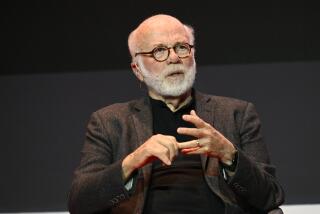As Questions Get Louder, Cheney Stays Silent
- Share via
WASHINGTON — The growing Enron debacle is turning up the political heat on Vice President Dick Cheney, who has refused to detail his contacts with company officials while developing a national energy policy last year.
Amid Democratic charges that he granted Enron undue access--and produced in secret an industry-friendly plan--Cheney’s unyielding stance has hampered the Bush administration’s efforts to distance itself from the scandal.
The flap dominated Thursday’s White House briefing, as it had on Wednesday. Press Secretary Ari Fleischer reiterated Cheney’s position: that he is defending executive privilege in rebuffing the congressional push, led by Reps. Henry A. Waxman (D-Los Angeles) and John D. Dingell (D-Mich.), for the information on his meetings with Enron officials.
Cheney and his aides say neither he nor his energy task force did anything wrong. Yet the impression lingers, even some Republicans conceded, that the vice president has something to hide.
“Cheney and his staff have violated the most fundamental of all scandal rules: full and fast disclosure,” said Larry J. Sabato, a University of Virginia political scientist. “A flat refusal to disclose information automatically makes the public and the press more suspicious, and it guarantees that the headlines about the controversy will be plentiful and unending.”
Many analysts predict that Cheney ultimately will have little alternative but to provide the information.
Mary Matalin, a senior Cheney advisor, rejected that scenario. She said in an interview that Cheney will not abandon his conviction that he is acting to protect executive privilege.
“There is a principle here that we want to preserve--for not just this administration but future administrations,” Matalin said. “The powers and prerogatives of the executive branch have been eroded, and we’re going to stop that.”
In resisting disclosure, however, Cheney and his aides are providing Democrats and other critics the opportunity to depict the White House as a shill for Enron, the nation’s seventh-largest company until it filed for bankruptcy.
“It may be a matter of principle, but they are going to get killed for it,” said Charles E. Cook, a Washington-based political analyst. “They are going to lose a lot of blood and, in the end, they will release” the requested information.
Cook added: “The question is, how much political pain they are going to sustain before releasing it.”
“The danger for Cheney in this Enron fiasco is perception,” added one top Republican strategist, who requested anonymity. “And perception in politics needs to be nipped in the bud--immediately. Right now, they are behind the perception eight-ball.”
Many Republicans and White House allies reject that view--reflecting a vigorous debate that sources say is raging in the West Wing on whether Cheney should turn over the information sought by Congress.
“My advice to him would be to hang in there. Hang tough. I don’t think he’s hurting himself,” said Washington lobbyist Tom Korologos, who has advised GOP presidents going back to Richard Nixon.
Another factor that has helped thrust Cheney into the glare of the Enron controversy is the trust and confidence he enjoys from President Bush.
“The problem with being as visibly influential as Cheney has been is that when things go wrong, he gets some of the blame,” said Joel K. Goldstein, a St. Louis University law professor and author of “The Modern American Vice Presidency.”
In the eyes of their political detractors, including environmental activists, Bush and Cheney were suspect on energy issues from their first day in office, given their background in the oil industry.
Cheney quickly fueled such concerns when, amid sharply rising energy prices, he seemed to discount the importance of conservation in dealing with the problem. Then his energy task force released a plan in May that angered environmentalists and conservationists by proposing, among other things, opening a small portion of Alaska’s Arctic National Wildlife Refuge to energy exploration.
Critics also immediately questioned the role of Enron executives in the plan’s formulation; Waxman and Dingell have been asking Cheney for months to disclose his contacts with the company. With Enron’s collapse late last year, those requests have escalated.
On Wednesday, Democrats on the House Government Reform Committee charged that there are at least 17 policies in the White House energy plan that are “virtually identical to positions Enron advocated.”
Administration officials took strong issue with that assertion. Matalin called it “transparent election-year politicking.”
Such unabated exchanges, however, point up the controversy’s corrosive effect on the White House and on Bush’s agenda.
“The big loser last week was the president’s education bill,” said a senior GOP strategist, noting that news coverage of the measure’s signing was overshadowed by the media’s focus on the Enron story.
“Mary Matalin can be flippant all she wants, but this isn’t going to go away,” said the Republican, who requested anonymity.
Sabato agreed.
“Even at this late stage, Cheney’s best route out of the controversy is the same as the original one early on--full disclosure,” he said.
“There is something about the White House that leads each new administration to believe they are exempt from the usual rules of scandal,” Sabato added. “Perhaps the headiness of power and popularity produces a kind of scandal amnesia. Cheney exhibits the symptoms.”
More to Read
Get the L.A. Times Politics newsletter
Deeply reported insights into legislation, politics and policy from Sacramento, Washington and beyond. In your inbox twice per week.
You may occasionally receive promotional content from the Los Angeles Times.










